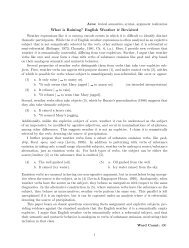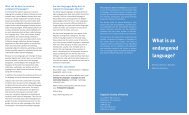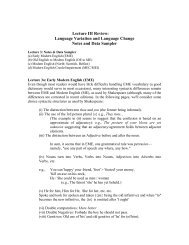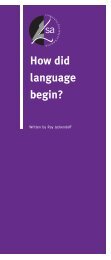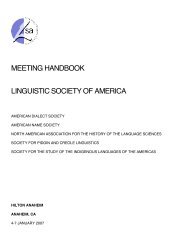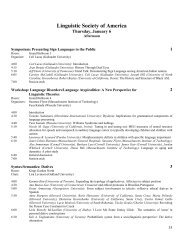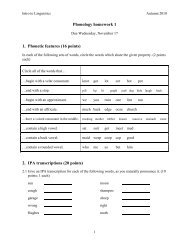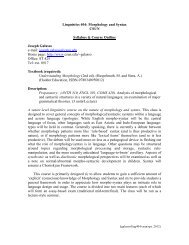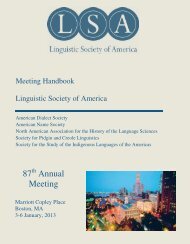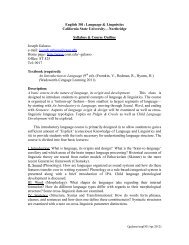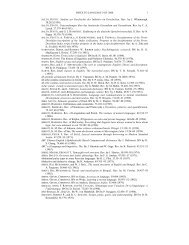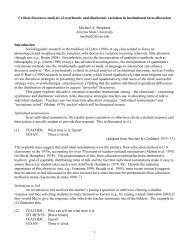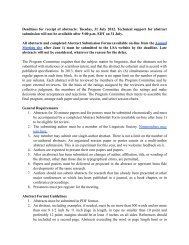here - Linguistic Society of America
here - Linguistic Society of America
here - Linguistic Society of America
Create successful ePaper yourself
Turn your PDF publications into a flip-book with our unique Google optimized e-Paper software.
Thursday, 3 JanuarySymposiumAbstracts:Eric Baković (University <strong>of</strong> California, San Diego/founding co-editor <strong>of</strong> Open Phonology)Generalizing openness: more suggestions for the future <strong>of</strong> scholarly publishingOur pr<strong>of</strong>essional academic labor is called for at many and diverse stages in the process <strong>of</strong> scholarly publication: research, writing,peer review, revision, and editorial work. The promise <strong>of</strong> open access is to make the fruits <strong>of</strong> this labor free for all to access. Butpublication itself is not free, and viable business models for supporting and sustaining open access ventures are thus vital. Thesemodels must <strong>of</strong> course take into account irreducible and tangible business costs; I suggest that they must also take creative risksand take into account some <strong>of</strong> the more intangible costs <strong>of</strong> our academic labor.Ellen Duranceau (MIT Libraries program manager for scholarly publishing and licensing)Open access at MIT: implementation and impactProvides an overview <strong>of</strong> the implementation <strong>of</strong> the MIT Faculty Open Access Policy, including how it works legally andlogistically and what the success and impact has been to date. Summarizes the ways libraries support open access on campus,including implementing open access policies, <strong>of</strong>fering open access publishing funds, negotiating contracts with journal publishersto enable author rights, hosting open access journals, and helping to build open textbooks.Kai von Fintel (Massachusetts Institute <strong>of</strong> Technology/founding co-editor <strong>of</strong> Semantics & Pragmatics)Taking an open access start-up journal to the next levelS&P, aneLanguage open access journal, has become firmly established as one <strong>of</strong> the top venues in semantics and pragmatics. Iwill discuss measures <strong>of</strong> its success, the challenges it faces now, and our plans for the future. I will also discuss why we think thatopen access journals have an important role to play in the transition to a new model <strong>of</strong> scholarly communication.Kathleen Fitzpatrick (Modern Language Association Director <strong>of</strong> Scholarly Communications)Open access publishing and scholarly societiesScholarly societies have traditionally supported themselves through membership dues, and the publications <strong>of</strong> societies have beenconsidered member benefits; a scholar who joins the association receives a subscription. Most societies have furthersupplemented those member dues with income from institutional subscriptions to society journals. In recent years, as the financialsituation faced by many societies has darkened (as have such situations across the academy), they’ve faced difficult choices abouthow to maintain their publications, and how to maintain the revenue that has been used to support other vital associationactivities. Today, however, those choices are being challenged by the increasing drive among many scholars to open access topublications. How can an organization based around the notion <strong>of</strong> creating value specifically for its members respond toincreasing pressures to make its work publicly accessible? This talk will explore experiments currently being conducted by a fewsocieties, as well as further experiments that should be conducted, in seeking new business models for scholarly societies, andnew relationships within those societies to the work <strong>of</strong> scholarly communication.Alyson Reed (Executive Director, <strong>Linguistic</strong> <strong>Society</strong> <strong>of</strong> <strong>America</strong>)Exploring business models for open access at the LSAIn recent years, the LSA has experimented with open access publishing under the auspices <strong>of</strong> eLanguage, while continuing topublish its flagship journal, Language, under a paid subscription model. Over the past year, the LSA has sought to develop aviable business model for sustaining its open access publishing activities, while expanding access to Language for those who arenot members or paid subscribers. Ms. Reed will discuss the various options explored by the “business models working group,”which was appointed by the LSA Executive Committee to formulate recommendations in this critical area <strong>of</strong> the LSA’soperations.Stuart Shieber (Harvard University/Director <strong>of</strong> Harvard Office for Scholarly Communication)Why open access is better for scholarly societiesI will argue that a scholarly ecosystem w<strong>here</strong> open-access journals predominate over toll-access journals is better for scholarlysocieties than a continuation <strong>of</strong> the status quo in which the converse holds.88



